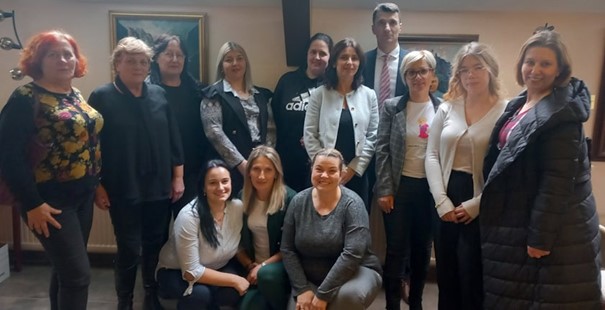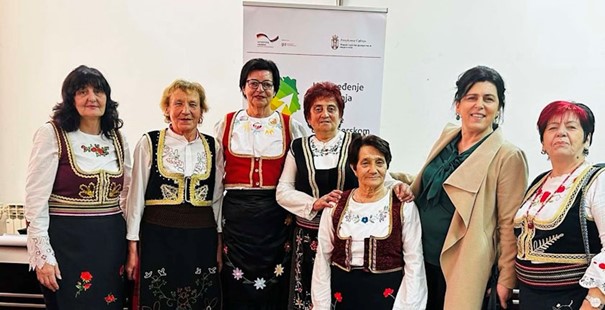Author: Stevan Vujasinović
Residents of rural areas in the municipalities of Priboj, Čajetina and Arilje have been suffering from frequent and long-term interruptions in the supply of electricity for years. These interruptions not only disrupt daily life, but also seriously hinder the development of family businesses, especially in tourism and agriculture.
However, there are solutions. Last week, the Regional Development Agency „Zlatibor“ (RDA Zlatibor) celebrated World Energy Efficiency Day (March 5) and International Women’s Day (March 8) almost simultaneously. On that occasion, RDA Zlatibor organized „energy talks“ with members of women’s associations from rural areas of these municipalities, and the main topic was energy efficiency and sustainable energy sources for rural households.

Energy needs and challenges in rural households
„In winter, we stay without electricity for several hours at a time.“ It’s not just an inconvenience, but a serious problem for heating and storing food, especially for those of us who have guests in rural tourism,“ says one of the participants in the conversation in Čajetina, which brought together members of the Čajetina Rural Women’s Association and the Zlata association. During the discussions, it was clearly pointed out that there is a great interest in the installation of solar panels, both in private households and in catering establishments. However, access to these technologies is often difficult due to high initial costs and complex procedures for obtaining subsidies, which despite the growing volume of funds available for this purpose still do not meet all existing demand. High initial costs and complex procedures for obtaining subsidies make it difficult to install solar panels. It is even more difficult to access subsidies for energy efficiency and these tenders are too often available primarily to those users who already have initial capital to invest and often go beyond the knowledge of the population in the villages.
The municipality of Čajetina recognizes the importance of energy efficiency and last year announced a public call for co-financing of energy efficiency measures in family houses and apartments. However, special support has not yet been provided for users with the status of an energy-vulnerable customer, which could further improve the availability of these measures to the wider population, namely to those people who need help the most.
 Photo: members of the Association of Rural Women of Čajetina and the Zlata Association/ Miloš Radojević
Photo: members of the Association of Rural Women of Čajetina and the Zlata Association/ Miloš Radojević
Possibilities for the use of renewable energy sources
One of the key conclusions of the discussion was that solar panels and heat pumps can significantly improve the situation. Aleksandar Macura from the RES Foundation pointed out that the law already allows households to produce their own energy and exchange it with the Electric Power Company of Serbia. „There are enough examples of good practice – about 2,500 households in Serbia already use rooftop power plants and function as a buyer-producer,“ emphasized Macura. However, solar panels still require initial investments of several thousand euros, which is an insurmountable obstacle for many.
The participants in the discussion proposed solutions such as subsidized loans with deferred payment in installments, so that this technology would be more accessible to pensioners and socially vulnerable persons.
Association and energy communities
Another important aspect of the discussion was the possibility of establishing energy communities. Serbia, in accordance with European regulations, opens space for joint production and use of solar energy within local communities. This means that local communities could install solar power plants and distribute energy among households.
This would be particularly beneficial for women who run family businesses in agriculture and tourism, as it would provide them with a stable source of energy without relying on an unpredictable distribution network.
Wood as a traditional but inefficient energy source
In many rural households, the use of wood biomass still dominates. The following views were also heard in Arilje: „wood is irreplaceable“ and „we believe in wood!“ However, for people in the countryside, wood, although it is the closest to them, is almost never the most efficient solution for heating, partly due to the humidity problem of this fuel, and mostly due to inefficient devices. There are fewer and fewer people in the countryside, so it is becoming more and more difficult and expensive to get a timely service of cutting and preparing wood, even from our own forests: „We have been using wood for decades, but who can afford quality dried wood today? We often heat with wet wood, which only increases consumption and air pollution,“ shared her experience of one of the participants in the conversation in Arilje, in which women from two associations: „Sibirka“ and „Ariljka“ participated.
 Photo: Members of the „Sibirka“ citizens’ association, together with members of the „Ariljka“ citizens’ association / Miloš Radojević
Photo: Members of the „Sibirka“ citizens’ association, together with members of the „Ariljka“ citizens’ association / Miloš Radojević
How to proceed?
In the process of energy transition, rural communities must not remain marginalized. Solar panels, energy communities and subsidies for more efficient heating are solutions that can bring concrete changes. However, the key to success lies in greater availability of these solutions to all citizens, regardless of their financial situation and place of residence. Energy sustainability in rural areas is not only a matter of comfort, but also of the survival and development of local communities. If we want villages to be vital and economically strong, it is necessary to provide them with a stable, sustainable and affordable source of energy. Through smart investments, better organization of subsidies and development of energy communities, it is possible to significantly improve the quality of life in these areas. In addition, additional education on the use and maintenance of energy efficient systems can contribute to a greater degree of adoption of these technologies.
„Energy talks“ with the women of the Zlatibor district are part of the project „Improving the use of sustainable energy in the Zlatibor region“, which is financed by the German Federal Ministry for Economic Cooperation and Development (BMZ) in cooperation with the Regional Development Agency „Zlatibor“. The project is implemented by Deutsche Gesellschaft für Internationale Zusammenarbeit (GIZ) GmbH.

